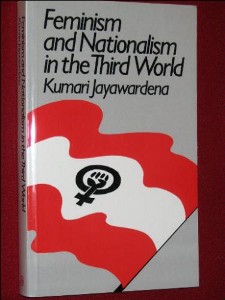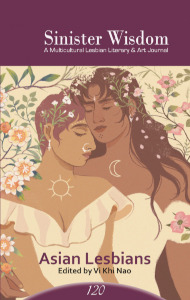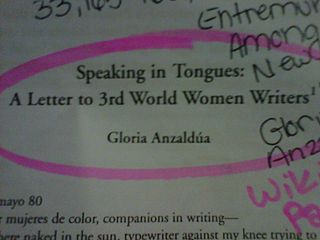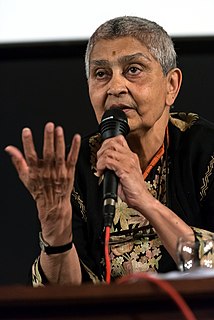 W
WAll the Women Are White, All the Blacks Are Men, But Some of Us Are Brave (1982) is a landmark feminist anthology in Black Women's Studies printed in numerous editions, co-edited by Akasha Gloria Hull, Patricia Bell-Scott, and Barbara Smith.
 W
WAunt Lute Books is a multicultural feminist press whose mission is to "publish literature by women whose voices have been traditionally under-represented in mainstream and small press publishing" and "distribute literature that expresses the true complexity of women’s lives and the possibilities for personal and social change." The publisher has a stated aim to embrace the opportunity to work with and support first-time authors.
 W
WConditions was a lesbian feminist literary magazine that came out biannually from 1976 to 1980 and annually from 1980 until 1990, and included poetry, prose, essays, book reviews, and interviews. It was founded in Brooklyn, New York, by Elly Bulkin, Jan Clausen, Irena Klepfisz and Rima Shore.
 W
WFeminism and Nationalism in the Third World is a 1986 publication by Sri Lankan author Kumari Jayawardena. Kumari’s book has been described as a feminist classic and widely used in gender and women’s studies to date as a primer of Third-World Feminism.
 W
WFeminist Theory: From Margin to Center is a 1984 book about feminist theory by bell hooks. The book confirmed her importance as a leader in radical feminist thought. The "margin" in the title refers to hooks' description of black women as existing on the margins and their lives hidden from mainstream American society as well as not being part of mainstream feminist theory. The book was published in French in 2017.
 W
WKumari Jayawardena is a leading feminist activist and academic in Sri Lanka. Her work is part of the canon of Third-world feminism which conceptualizes feminist philosophies as indigenous and unique to non-Western societies and nations rather than offshoots of Western feminism. She has taught at the University of Colombo and the International Institute of Social Studies.
 W
WMexican American Women's National Association, known today as MANA, A National Latina Organization, advocates for equality and empowers Latinas through leadership development. MANA was founded in 1974, making it one of the oldest active Mexican-American advocacy organizations, and as of 2000, it is considered the largest Latina organization in the United States. The organization was formed to address the intersection of Mexican-American and women's needs for equal rights. The founders created MANA with the intent of having a Latina-oriented organization. MANA publicizes and addresses Latina perspectives and needs through Social movements, Leadership education, and Advocacy within federal, state, and local governments. They have been involved with multiple major social movements throughout their history. These include advocating for the Equal Rights Amendment and Reproductive rights, as well as social movements on education, leadership development, women's healthcare, and racial discrimination in the work. MANA currently operates from its home base in Washington, D.C. and has local chapters across the nation.
 W
WChandra Talpade Mohanty is a Distinguished Professor of Women's and Gender Studies, Sociology, and the Cultural Foundations of Education and Dean's Professor of the Humanities at Syracuse University. Mohanty, a postcolonial and transnational feminist theorist, has argued for the inclusion of a transnational approach in exploring women’s experiences across the world. She is author of Feminism Without Borders: Decolonizing Theory, Practicing Solidarity, and co-editor of Third World Women and the Politics of Feminism, Feminist Genealogies, Colonial Legacies, Democratic Futures, Feminism and War: Confronting U.S. Imperialism,, and The Sage Handbook on Identities.
 W
WNezihe Muhiddin Tepedelengil was a Turkish women's rights activist, suffragette, journalist, writer and political leader.
 W
WThe National Union of Sahrawi Women is the women's wing of the Polisario Front. It was created in 1974, and claims to have 10,000 members, divided between the Sahrawi refugee camps, the Liberated territories, the Moroccan-occupied part of Western Sahara and the Sahrawi diaspora.
 W
WOvarian Psycos is a bicycle brigade established in Boyle Heights, Los Angeles, in 2010. The group was formed to foster sisterhood that could feel comfortable taking up space as well confronting the harassment of women. Rides are organized monthly on the full moon. A documentary by Joanna Sokolowski and Kate Trumbull-LaValle premiered in 2016 at SXSW and was screened on March 27, 2017 on the KCET Independent Lens program.
 W
WSinister Wisdom is an American lesbian literary, theory, and art journal published quarterly in Berkeley, California. Started in 1976 by Catherine Nicholson and Harriet Ellenberger (Desmoines) in Charlotte, North Carolina, it is the longest operating lesbian journal to date with 105 publications. Each journal covers a variety of topics pertaining to the lesbian experience and contains a combination of creative writing, poetry, literary criticism, feminist theory, ads, and notes from the editor(s). Sinister Wisdom accepts submissions from novice to accredited writers and has featured the works of writers and artists such as Audre Lorde and Adrienne Rich. The journal has been a pioneer in female publishing, working with female operated publishing companies such as Whole Women Press and Iowa City Women's Press. Sapphic Classics, a partnership between Sinister Wisdom and A Midsummer Night's Press, reprints classic lesbian works for contemporary audiences.
 W
WSpeaking in Tongues: A Letter to 3rd World Women Writers is a letter written by Gloria E. Anzaldúa. The letter was drafted in 1979 and was published in Anzaldúa’s feminist anthology This Bridge Called My Back: Writings by Radical Women of Color (1981). Writing this essay in the format of a letter, Anzaldua urges the reader to “write from the body” and she connects her body to other bodies, creating a community of embodied people. This essay is addressed to women of color as she shows sympathy, encouragement, and words of wisdom towards them. The essay addresses women of color and encourages these women to make their personal, embodied experiences visible in the text. The reader must also allow the text to enter herself, if the reader chooses to enter the text.
 W
WGayatri Chakravorty Spivak is an Indian scholar, literary theorist, and feminist critic. She is a University Professor at Columbia University and a founding member of the establishment's Institute for Comparative Literature and Society.
 W
WThis Bridge Called My Back: Writings by Radical Women of Color is a feminist anthology edited by Cherríe Moraga and Gloria E. Anzaldúa. First published in 1981 by Persephone Press. The second edition was published in 1983 by Kitchen Table: Women of Color Press. The book's third edition was published by Third Woman Press until 2008, when it went out of print. In 2015, the fourth edition was published by State University of New York Press, Albany.
 W
WWomanism is a social theory based on the history and everyday experiences of black women. It seeks, according to womanist scholar Layli Maparyan (Phillips), to "restore the balance between people and the environment/nature and reconcil[e] human life with the spiritual dimension". Writer Alice Walker coined the term "womanist" in a short story, "Coming Apart", in 1979. Since Walker's initial use, the term has evolved to envelop varied, and often opposing, interpretations of concepts such as feminism, men, and blackness.